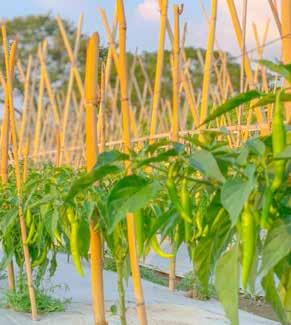
4 minute read
REVOLUTION OF THE YOUNG
from Magazine 2021 3Q
by LearnPH
PARTNERS IN THE FIELD
EINAR M. DE MESA
Advertisement
JEHANEL V. SORIANO ANTONIO T. SABANGAN

revolution MARY GRACE M. NIDOY
OF THE
From igniting movements to catapulting global phenomena in technology, politics, and business, the youth has played a big role throughout our history. Armed with idealism, zeal, and passion, the world’s young cohort continues to grow in terms of population.
According to the UN Population FundPhilippines, our country now has the largest generation of young people in history with 30 million aged 10-24 years old, accounting for 28% of our population.
With a gamut of challenges facing the food systems, engaging the largest youth generation is inarguably necessary. This surfaced in a recent dialogue organized by the Southeast Asian Regional Center for Graduate Study and Research in Agriculture (SEARCA) on ASEAN’s food systems where the youth’s perspective was taken into account to help transform higher agricultural education. Toward the 2030 agenda and intensifying momentum leading up to the UN’s 2021 Food Systems Summit, the world needs the youth more than ever. When the world is at a standstill, some take various pathways to transform food systems, starting in their own community. Here are the young people helping to make our food systems more sustainable, profitable, and resilient:
JEHANEL V. SORIANO, 25
Entrepreneur
This 2017 agribusiness graduate from Central Luzon State University immediately put up her own agriculture supply store in her birthplace in Ilagan City, Isabela.
“When I was young, I enjoyed selling goods from our sari-sari store. I’ve always been a business-minded person since then,” Jehanel recalled.
young
Even before the pandemic stunned the world in March 2020, she had quit her job as a market inspector in a governmentowned research center and enrolled in the Rice Competitiveness Enhancement Fund-Rice Extension Program’s Training of Trainers to start her own farm school. While the process from applying as a learning site to farm school was rigorous, Jehanel said it was all worth it. Since its establishment in July 2020, her Jesla Integrated Farm has trained 200 farmers.
With her entrepreneurial mentality, she also availed of the DA-Agricultural Credit Policy Council Program for her layer production business worth P5 million.
EMMANUEL R. SALONGA ANTONIO T. SABANGAN III

“The pandemic has made me realize the importance of food and our farmers. In agriculture, young people could engage in business and help the producers of our food at the same time,” Jehanel said.

ANTONIO T. SABANGAN III, 30
Farmer-leader
Fondly called “Akim”, he is a former overseas Filipino worker-banker in Saudi Arabia. In 2018, his uncle convinced him to go back to the country for good and manage their 2.5-ha farm.
“At first the farm was only intended for our own sustenance but the way we look at agriculture has changed. We realized that the farm can serve more people,” Akim said.
He then availed of government’s free training courses and established a farm school in Botolan, Zambales called Bukid ni Tatay, in memory of their grandfather who had always wanted a farm for his family.
For Akim, farming is a vocation that is “meant to serve others”. He did so when he became part of the province-wide organization together with his classmates in the training courses. The members of the Pagasa Youth Farmers Association recently partnered with the Department of Trade and Industry so they could sell their products in various trade fairs.
“There are so many opportunities waiting for young farmers. I aim to bring these opportunities to them through our association,” Akim declared.
LAWRENCE L. CHUA
-LAWRENCE L. CHUA ”
LAWRENCE L. CHUA, 29
Farm mechanization advocate
It took many jobs in the corporate world and business ventures before Lawrence found himself planting rice in the farm.
In 2018, this civil engineering graduate from De La Salle University acquired an 8-ha land in Tumauini, Isabela and developed it into a farm school and integrated farm. Since then, he has been based in Isabela and enrolled himself in various training courses given by the government. For Lawrence, everything starts with a mindset. He is, of course, speaking from his experience as he now sees farming as the most sustainable venture. He believes that farm mechanization is the way to go forward in terms of promoting agriculture to young people.
“The youth have this perception that farming is tedious but with machines now roaring and readily available, we can easily entice them to venture in agriculture. My advice to them is to try it first before condemning the sector,” Lawrence explained.
“Every aspect of agriculture opens more doors for you,” he added.
For instance, the youth could make a profit out of the many productions that agriculture could offer. Lawrence wants to reinvent the farmers’ image and envisions many more of them in business suits in the future. ·










